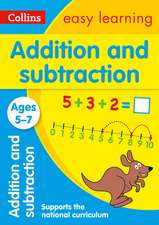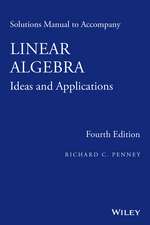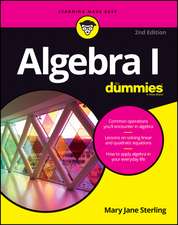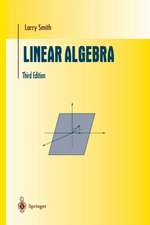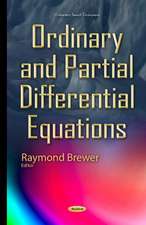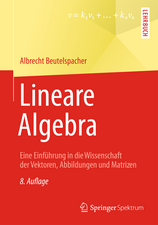Residue Currents and Bezout Identities: Progress in Mathematics, cartea 114
Editat de C.A. Berenstein, R. Gay, A. Vidras, A. Ygeren Limba Engleză Paperback – 18 oct 2012
| Toate formatele și edițiile | Preț | Express |
|---|---|---|
| Paperback (1) | 381.21 lei 6-8 săpt. | |
| Birkhäuser Basel – 18 oct 2012 | 381.21 lei 6-8 săpt. | |
| Hardback (1) | 578.67 lei 6-8 săpt. | |
| Birkhauser – 30 sep 1993 | 578.67 lei 6-8 săpt. |
Din seria Progress in Mathematics
- 24%
 Preț: 691.35 lei
Preț: 691.35 lei - 24%
 Preț: 740.79 lei
Preț: 740.79 lei -
 Preț: 308.20 lei
Preț: 308.20 lei - 20%
 Preț: 695.88 lei
Preț: 695.88 lei -
 Preț: 362.51 lei
Preț: 362.51 lei -
 Preț: 308.13 lei
Preț: 308.13 lei - 18%
 Preț: 749.27 lei
Preț: 749.27 lei - 9%
 Preț: 766.41 lei
Preț: 766.41 lei - 20%
 Preț: 631.08 lei
Preț: 631.08 lei - 24%
 Preț: 638.86 lei
Preț: 638.86 lei - 15%
 Preț: 580.82 lei
Preț: 580.82 lei -
 Preț: 395.09 lei
Preț: 395.09 lei -
 Preț: 392.37 lei
Preț: 392.37 lei -
 Preț: 376.80 lei
Preț: 376.80 lei -
 Preț: 390.25 lei
Preț: 390.25 lei - 18%
 Preț: 729.53 lei
Preț: 729.53 lei - 15%
 Preț: 652.49 lei
Preț: 652.49 lei - 15%
 Preț: 649.22 lei
Preț: 649.22 lei - 18%
 Preț: 897.95 lei
Preț: 897.95 lei -
 Preț: 385.08 lei
Preț: 385.08 lei -
 Preț: 391.02 lei
Preț: 391.02 lei -
 Preț: 378.54 lei
Preț: 378.54 lei - 15%
 Preț: 531.59 lei
Preț: 531.59 lei - 15%
 Preț: 642.83 lei
Preț: 642.83 lei - 15%
 Preț: 650.69 lei
Preț: 650.69 lei -
 Preț: 392.37 lei
Preț: 392.37 lei -
 Preț: 398.53 lei
Preț: 398.53 lei - 15%
 Preț: 699.28 lei
Preț: 699.28 lei -
 Preț: 416.92 lei
Preț: 416.92 lei -
 Preț: 385.84 lei
Preț: 385.84 lei - 18%
 Preț: 902.65 lei
Preț: 902.65 lei - 18%
 Preț: 802.28 lei
Preț: 802.28 lei - 15%
 Preț: 640.06 lei
Preț: 640.06 lei - 18%
 Preț: 1129.83 lei
Preț: 1129.83 lei - 15%
 Preț: 494.03 lei
Preț: 494.03 lei
Preț: 381.21 lei
Nou
Puncte Express: 572
Preț estimativ în valută:
72.94€ • 76.16$ • 60.37£
72.94€ • 76.16$ • 60.37£
Carte tipărită la comandă
Livrare economică 05-19 aprilie
Preluare comenzi: 021 569.72.76
Specificații
ISBN-13: 9783034896801
ISBN-10: 3034896808
Pagini: 176
Ilustrații: XI, 160 p.
Dimensiuni: 155 x 235 x 9 mm
Greutate: 0.25 kg
Ediția:Softcover reprint of the original 1st ed. 1993
Editura: Birkhäuser Basel
Colecția Birkhäuser
Seria Progress in Mathematics
Locul publicării:Basel, Switzerland
ISBN-10: 3034896808
Pagini: 176
Ilustrații: XI, 160 p.
Dimensiuni: 155 x 235 x 9 mm
Greutate: 0.25 kg
Ediția:Softcover reprint of the original 1st ed. 1993
Editura: Birkhäuser Basel
Colecția Birkhäuser
Seria Progress in Mathematics
Locul publicării:Basel, Switzerland
Public țintă
ResearchCuprins
1. Residue Currents in one Dimension. Different Approaches.- 1. Residue attached to a holomorphic function.- 2. Some other approaches to the residue current.- 3. Some variants of the classical Pompeiu formula.- 4. Some applications of Pompeiu’s formulas. Local results.- 5. Some applications of Pompeiu’s formulas. Global results.- References for Chapter 1.- 2. Integral Formulas in Several Variables.- 1. Chains and cochains, homology and cohomology.- 2. Cauchy’s formula for test functions.- 3. Weighted Bochner-Martinelli formulas.- 4. Weighted Andreotti-Norguet formulas.- 5. Applications to systems of algebraic equations.- References for Chapter 2.- 3. Residue Currents and Analytic Continuation.- 1. Leray iterated residues.- 2. Multiplication of principal values and residue currents.- 3. The Dolbeault complex and the Grothendieck residue.- 4. Residue currents.- 5. The local duality theorem.- References for Chapter 3.- 4. The Cauchy-Weil Formula and its Consequences.- 1. The Cauchy-Weil formula.- 2. The Grothendieck residue in the discrete case.- 3. The Grothendieck residue in the algebraic case.- References for Chapter 4.- 5. Applications to Commutative Algebra and Harmonic Analysis.- 1. An analytic proof of the algebraic Nullstellensatz.- 2. The membership problem.- 3. The Fundamental Principle of L. Ehrenpreis.- 4. The role of the Mellin transform.- References for Chapter 5.
Recenzii
"What an interesting idea! Dealing with residues from the point of view of complex variable theory! We thought that that was all over, after the advent of the Grothendieck hordes. But here we find some brave souls that reassert the primacy of analysis over abstract nonsense! Congratulations!"
- The Bulletin of Mathematical Books
- The Bulletin of Mathematical Books


